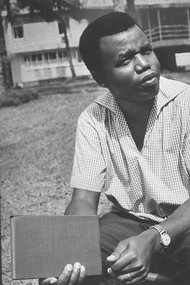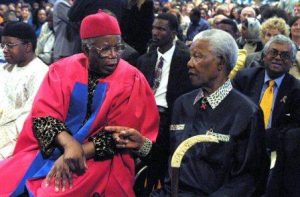Chinua Achebe Re-Asserted African Dignity

There is mourning as well as celebration all over the world to salute this great son of Africa. This can be seen and heard in special news broadcasts, announcements, marketplace meetings, press releases, emails and discussions of all sorts. As a lover of African literature and someone who reveres Achebe’s works, I have a take on the matter as well.
Wole Soyinka is imploring Ogun; Ali Mazrui has his hands on his head; Nadine Gordimer is fretting in her study; Ben Okri is stupefied; Chima Amanda is utterly disheveled; the pen is trembling in the hand of Abiola Irele, and Tala Kashim is perusing the dictionary: that is the imaginary scenario of how things fell apart following news of the passing away of Africa’s leading wordsmith.
Widely acclaimed as the father of African literature, the Nigerian novelist is globally revered for his literary classic, Things Fall Apart (1958), which has been translated into over 50 languages and has sold more than 8 million copies. Other notable works of Achebe include No Longer At Ease, A Man of the People, Arrow of God, and Anthills of the Savannah.
Achebe’s writings are deeply revealing about the history of Nigeria or Africa from the pre-colonial, colonial, and post-colonial periods. His prose is generally concerned with showing that African dignity, demeaned partly as a result of contact with Europe, must be reasserted. However, Achebe neither fully disparages Western culture nor argues for his culture to achieve universality, but he enjoins every race to bring their gifts to the global festival of culture in order that humankind would be enriched.
Moreover, Achebe interrogates, in his works, issues of oppression, moral decadence, and political corruption that are entrenched in contemporary Africa.
Achebe’s other forte is his versatile appropriation of the English language in his discussion of Igbo folklore. Most readers of his novels would acknowledge the lucidity of his language which is marked by his deft use of proverbs, innuendoes, metaphors, and other literary devices, which showcase the rhetorical power of Igbos.
Winner of the Man Booker International Prize (2007), founding editor of African Writers Series, and other numerous awards across the world, Achebe taught at several universities in Africa and the United States, including Bard College and, most recently, Brown University, where he was David and Mariana Fisher Professor of Africana Studies.
Although he will be deeply missed by the literary world, his contribution to the arts lives on. Like Moliere is to the French, Shakespeare to the English, or Cervantes to the Spaniards so is Achebe to Africans as an artistic muse.

